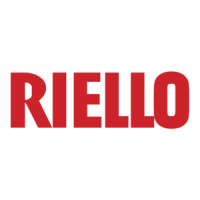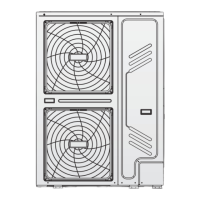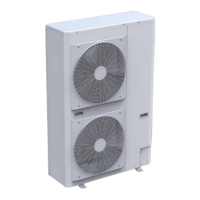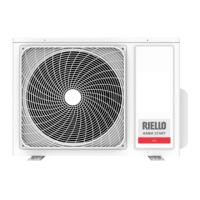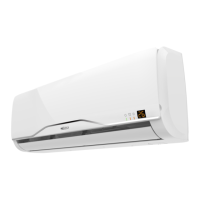Do you have a question about the Riello NexPolar Series and is the answer not in the manual?
Important cautions for handling and operating the device safely, including verification of consignment and compliance.
Key rules to follow regarding electrical safety, interaction with the device, and prohibiting unauthorized interventions.
Overview of the NexPolar unit's features, performance, and intended use for heating, cooling, and DHW.
Details on built-in safety mechanisms like pressure switches, safety valves, and freeze protection devices.
Information on locating and understanding the device's identification plate for technical data.
Diagram and labeling of major components within the hydronic module and the overall system.
Detailed performance data, electrical requirements, and physical attributes for different models.
Performance efficiency data (COP, SCOP, EER) presented based on various climatic conditions.
Defines the operational boundaries for cooling and heating modes based on external temperatures.
Information on head loss characteristics of the circulation pump for system sizing.
Details on the refrigerant circuit layout and the positioning of critical temperature sensors.
Procedures for checking the product upon delivery for completeness and integrity.
Guidance on the correct placement of product labels for identification.
Physical size and weight specifications for installation planning and site preparation.
Instructions for safe lifting, moving, and unpacking the unit using appropriate tools.
Criteria for selecting an appropriate and compliant installation site, considering local regulations.
Guidelines for maintaining clearance around the unit for proper airflow and maintenance access.
Recommendations for placing the unit on level surfaces and considering elevation requirements.
Considerations for upgrading or replacing older system components, ensuring compliance.
Requirements for the water system to ensure proper heat pump operation and fluid quality.
Details on pipe sizes, connection types, and preparatory steps for water hookup.
Visual representation of water circuit connections, including necessary components and safety features.
Procedures for filling the system with water, checking pressure, and for draining the system.
Electrical schematics for power and control circuits, including component identification.
Steps for connecting the unit to the main power supply, safety grounding, and accessory components.
Information on connecting external controls, sensors, and accessories to the unit's terminal blocks.
Explanation of the control panel interface, function keys, and basic operation for setup and monitoring.
Pre-checks and preparatory steps required before initial startup, performed by qualified personnel.
Steps to follow for activating the unit after commissioning, including checks and parameter settings.
Procedure for brief periods of inactivity, maintaining essential protections like antifreeze.
Instructions for safely shutting down the unit for extended periods, including system draining.
Glossary of technical abbreviations used throughout the manual for clarity.
How to set and adjust temperature setpoints for different modes using curves or fixed values.
Function to maintain minimum room temperature, preventing freezing by activating heating.
Mechanism to prevent freezing of the water heat exchanger and pipes by activating the pump and heaters.
Configuration and operation details for producing domestic hot water, including tank protection.
How to connect and configure multiple units in a master/slave setup for enhanced capacity.
Settings for controlling internal, external, and auxiliary pumps based on installation type.
How electric heaters are utilized for supplementary heating or protection against low temperatures.
Information on connecting and using an external boiler as an emergency heating device.
Explanation of how the unit prevents and removes ice buildup on external coils via a defrost cycle.
How to limit compressor capacity during specific times for noise reduction, enhancing comfort.
General maintenance tasks and recommended service intervals for optimal unit performance and reliability.
Basic visual checks and simple cleaning tasks that can be performed by users.
In-depth electrical, hydronic, and mechanical checks requiring technical knowledge.
Advanced servicing requiring specialized skills, tools, and manufacturer authorization.
Specified torque values for tightening main electrical connections to ensure secure contact.
Recommended torque settings for various mechanical fasteners to ensure proper assembly.
Procedures for cleaning the unit's air-side heat exchanger to maintain airflow and efficiency.
Checks and maintenance for the water-side heat exchanger, including foam and connections.
Important safety precautions and checks before performing unit interventions, especially regarding power isolation.
How to verify the correct refrigerant charge for optimal performance, particularly in cooling mode.
Parameters related to the unit's display, sensor readings, and operating status.
Parameters relevant to the unit's servicing, diagnostics, and testing procedures.
Parameters used to configure temperature setpoints for heating, cooling, and DHW modes.
Parameters for system setup, mode selection, and advanced operational settings.
